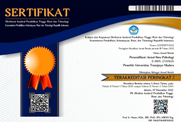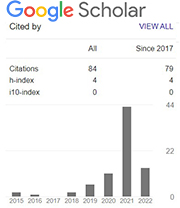The Role of Self-Regulation on the Tendency of Nomophobia in College Students
Abstract
Keywords
Full Text:
PDFReferences
Agniwijaya, M., Hamidah (2019). Perilaku nomophobic pada mahasiswa di fakultas psikologi universitas airlangga surabaya. Jurnal Psikologi Klinis Dan Kesehatan Mental Tahun 2019, Vol. 8, Pp. 76-88. Departemen Psikologi Klinis Dan Kesehatan Mental, Fakultas Psikologi Universitas Airlangga. Surabaya.
Aljomaa, S. S., Al.Qudah, M. F., Albursan, I. S., Bakhiet, S. F., & Abduljabbar, A. S. (2016). Smartphone addiction among university students in the light of some variables. Computers in Human Behavior, 61, 155–164. https://doi.org/10.1016/j.chb.2016.03.041
Amalia, R.F & Hamid, A.Y. (2020). Adiksi smartphone, kesehatan mental anak, dan peranan pola asuh. Jurnal Ilmu Keperawatan Jiwa Volume 3 No 2, Hal 221 - 240, Mei 2020. Persatuan Perawat Nasional Indonesia (PPNI) Jawa Tengah
American Psychiatric Association (APA). (2013). DSM V - Diagnostic and statistical manual for mental disorder (Fifth Edition) / The fifth Diagnostic and Statistical Manual of Mental Disorders. Washington, DC & London, England: APA. https://doi.org/10.1176/appi.books.9780890425596
Anami, F. R. (2021). Pengaruh nomophobia terhadap regulasi diri pada remaja di karang taruna waras Sragen. Skripsi. Universitas Islam Negeri Raden Mas Said. Surakarta.
APJII. (2022). Profil Internet Indonesia 2022. Indonesia: Asosiasi pengguna jasa internet Indonesia
Azwar. S. (2012). Penyusunan Skala. Edisi Kedua. Yogyakarta : Pustaka Pelajar
Azwar. S. (2018). Reliabilitas dan validitas. edisi kedua. Yogyakarta : Pustaka Pelajar.
Buctot, D., Kim, N., Kim, SH. (2020). The role of nomophobia and smartphone addiction in the lifestyle profiles of junior and senior high school students in the Philippines. https://doi.org/10.1016/j.ssaho.2020.100035
Bivin, J.B., Mathew, P.Thulasi, P.C., Philip, J. (2013). Nomophobia do we really need to worry about?: A cross sectional study on nomophobia severity among male under graduate student of health sciences. Review of Progres, volume 1. Hal 1-5
Bragazzi, N. L., & Del Puente, G. (2014). A proposal for including nomophobia in the new DSM-V. Psychology Research and Behavior Management. https://doi.org/10.2147/PRBM.S41386
Damaianti, S. (2021). Strategi regulasi diri dalam peningkatan motivasi membaca. Jurnal Pendidikan Bahasa dan Sastra Indonesia, 8 (1) Januari 2021. Universitas Pendidikan Indonesia. Bandung. https://doi.org/10.33603/dj.v8i1.4613
Dasiroh, U. (2017). Fenomena nomophobia di kalangan mahasiswa (studi deskriptif kualitatif mahasiswa Univeritas Riau). Jurnal Ilmiah Fakultas Ilmu Komunikasi Volume 6 Nomor 1. Program Studi Ilmu Komunikasi Universitas Riau. https://doi.org/10.25299/medium.2017.vol6(1).1080
Davidson, G, C. (2006). Psikologi abnormal (edisi ke 9). Jakarta: PT. Raja Grapindo Persada.
Deursen, A., Bolle, C. L., Hegner, S. M., & Kommers, P. (2015). Modeling habitual and addictive smartphone behavior: The role of smartphone usage types, emotical intelligence, social stress, self-regulation, age, and gender. Computers in Human Behavior, 45, 411-420. https://doi.org/10.1016/j.chb.2014.12.039
Dixit, S., Shukla, H., Bhagwat, A. K., Bindal, A., Goyal, A., Zaidi, A. K., & Shrivastava, A. (2010). A study to evaluate mobile phone dependence among students of a medical college and associated hospital of central India. Indian journal of community medicine: official publication of Indian Association of Preventive & Social Medicine, 35(2), 339. https://doi.org/10.4103/0970-0218.66878
Effendi, S. (2017). Regulasi diri dalam belajar (self-regulated learning) pada remaja yang kecanduan game online. Psikoborneo, Vol 5, No 2, 2017: 187-191. Fakultas Ilmu Sosial dan Ilmu Politik Universitas Mulawarman. Samarinda. https://doi.org/10.30872/psikoborneo.v5i2.4362
Gupta, R. (2019). Nomophobia : A Smartphone addiction. The Internasional Journal of Indian Psychology, 7 (1), 969-979. https://doi.org/10.35344/japss.519609
Hadi, S. (2017). Metodologi research Jilid 2. Yogyakarta : Andi Offset.
Https://News.Detik.Com/Berita-Jawa-Timur/D-3839164/2-Siswa-Kecanduan-Smartphone-Disdikbud-Penggunaannya-Dievaluasi. Diakses pada tanggal 08 Maret 2022
Harkin, J. (2003). Mobilisation : Thee growing public interest in mobile tecnology. Demos.
Kanmani, A., Bhavani, U., & Maragatham, R. S. (2017). Nomophobia–An insight into its psychological aspects in India. International Journal of Indian Psychology, 4(2), 5–15. https://doi.org/10.25215/0402.041
Pakpahan, S. (2022). Hubungan antara kontrol diri dengan kecenderungan nomophobia pada siswa SMAN 1 Tarutung. Skripsi. Universitas Medan Area.
Pavithra, M.B, Madhukumar, S., T.S., Mahadeva, M. (2015). A study on nomophobia mobile phone dependence, among students of a medical college in bangalore: National. Journal of Community Medicine, (6), 340-341.
Pisani, L. (2017). Hubungan antara regulasi diri dengan kecenderungan pembelian impulsif pada remaja akhir terhadap produk barang. Skripsi. Fakultas Psikologi Universitas Sanata Dharma.
Rakhmawati, S. (2017). Studi deskriptif nomophobia pada mahasiswa Di Universitas Muhammadiyah Malang. Skripsi. Fakultas Psikologi Universitas Muhammadiyah Malang
Safira, E. (2021). Hubungan antara kontrol diri dengan nomophobia (no mobile phone phobia). Skripsi. Fakultas Psikologi Universitas Islam Riau.
Sudarji, S. (2017). Hubungan antara nomophobia dengan kepercayaan diri. Jurnal Psikologi Psibernetika, 10 (1). https://doi.org/10.30813/psibernetika.v10i1.1041
Syafrida, R. (2014). Regulasi diri dan intensitas penggunaan smartphone terhadap keterampilan sosial. Jurnal Pendidikan Usia Dini Volume 8 Edidi 2, November 2014. Syafrida Stkip Bina Bangsa Getsempena Banda Aceh. http://journal.unj.ac.id/unj/index.php/jpud/article/view/3602/2631
Widyastuti, A., Mulyana, S. (2018). Potret nomophobia (no mobile phone phobia) di kalangan remaja. Jurnal Fokus Konseling , Volume 4, No. 1 (2018), 62-71. Bimbingan dan Konseling Universitas Ahmad Dahlan, Yogyakarta. https://doi.org/10.26638/jfk.513.2099
Yildirim, C. (2014). Exploring the dimensions of nomophobia: Developing and validating a questionnaire using mixed methods research. Graduate Theses and Dissertat. 1-102.
Yuwanto, L. (2010). Mobile phone addict. Surabaya: CV Putra Media Nusantara
DOI: https://doi.org/10.21107/personifikasi.v15i2.24842
Refbacks
- There are currently no refbacks.
Copyright (c) 2024 Prilya Shanty Andrianie

This work is licensed under a Creative Commons Attribution 4.0 International License.


Personifikasi by Universitas Trunojoyo Madura is licensed under a Creative Commons Attribution 4.0 International License.










